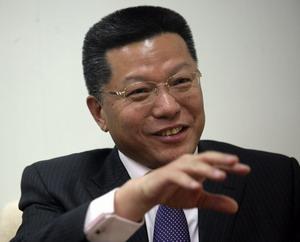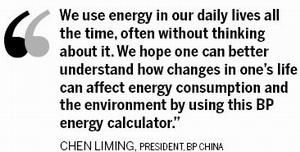Log on to the website of British energy giant BP and you will find an online calculator that can help you to count your energy use and carbon dioxide (CO2) emissions.
"We use energy in our daily lives all the time, often without thinking about it. We hope one can better understand how changes in one's life can affect energy consumption and the environment by using this BP energy calculator," Chen Liming, president of BP China, told China Daily in an exclusive interview.

 BP has worked to promote the use of this calculator among college students in Shanghai municipality and Liaoning province over the past two years, said Chen, adding that it was just one example of the company's work in protecting the environment and combating climate change.
BP has worked to promote the use of this calculator among college students in Shanghai municipality and Liaoning province over the past two years, said Chen, adding that it was just one example of the company's work in protecting the environment and combating climate change. As a global energy company, BP has been addressing great importance to energy and environmental issues since the early 1990s, he said. In 2005 the company announced it would invest $8 billion in the development of alternative energy over the next 10 years.
The investment will cover four main areas: solar, wind and biomass energy, and carbon capture and storage (CCS).
By the end of 2009 the company had invested $4 billion in developing alternative energy, said Chen. "China has now become our main production base in the solar energy sector," he added.
"The energy, environment, and climate change issues are crucial to the future development of both China and the rest of the world. I believe such issues will be also given priority during the ongoing two annual sessions of the National People's Congress (NPC) and the Chinese People's Political Consultative Conference (CPPCC) this month".
More cooperation
According to Chen, one specific issue he will pay much attention to during the two sessions is China's cooperation with foreign partners in the energy industry.
BP saw a breakthrough in its collaboration with Chinese partners last year - together with China's largest oil company China National Petroleum Corp (CNPC), it won a contract to develop the Rumaila oilfield in Iraq.
The consortium, led by BP with CNPC and the Iraq government's representative State Oil Marketing Organization, has agreed to nearly triple the Rumaila field's output to almost 3 million barrels of oil a day. That would make it the world's second-largest producing oilfield.
"This is definitely a milestone in our cooperation with China's oil companies," said Chen. "It will also help us to further strengthen our collaboration with other State-owned oil companies in China."
Having been in China for more than 30 years, BP now has a full business portfolio in the country. The company will "widen and deepen" its cooperation with Chinese partners this year, said Chen,
There were many highlights in BP's business in China last year, he added. For instance, the Shanghai SECCO petrochemical deal, a joint project between BP and China's largest refiner Sinopec, has seen expansion of its ethylene production capacity from 900,000 tons per year to 1.2 million tons yearly.
In spite of the tough economic situation in 2009, BP still added a further $200 million to its investment in China last year, said Chen. The company's investment in the country so far totals $4.7 billion, making it the largest investor among global energy companies in China.
Although now the Chinese market still accounts for a relatively small part in BP's global business, the market "is of strategic importance as it has huge growth potential", said Chen.
China is now the world's second largest energy and oil consumer. Industry insiders said that country's energy consumption would see continuous growth over the next few years as it needs more of it to fuel its rapid economic development.
"BP is committed to supporting China efforts for its energy security," said Chen.
Clean energy
Commenting on the future strategy of BP in China, Chen reiterated the importance of the development of clean energy.
The company and the Chinese Academy of Sciences (CAS) established a clean energy commercialization center in Shanghai in 2008, jointly investing 500 million yuan to make a business from Chinese clean energy technologies.
The center will draw on the expertise and experience of both partners to integrate individual energy-related technologies - such as coal gasification and conversion.
The establishment of the center is in line with the rapid growth of China's clean energy sectors in recent years, said Chen. Clean energy is expected to account for 15 percent of China's total energy mixture by the year 2020.
Some sectors in China, such as the wind power industry, have seen more than 100 percent annual growth over the past three years. Such a boom has attracted companies from all over the world to enter the market.





